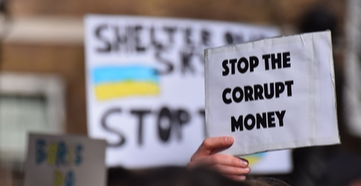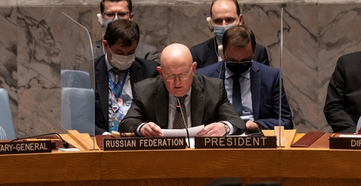Ukraine: Conflict complicates EU rule of law mission in Hungary and Poland
Polly BotsfordFriday 1 April 2022

Since Russia’s invasion of Ukraine in late February, EU Member States such as Hungary, Poland, Romania and Slovakia have become destinations for the millions of refugees fleeing the conflict. In particular, in Hungary this has come at a sensitive time, coinciding with the country’s parliamentary elections on 3 April.
The conflict has also complicated pressing issues that the EU has been grappling with, such as the rule of law mission in Eastern Europe. The European Commission has been involved in a stand-off with Poland and Hungary over breaches of the rule of law by the two countries, such as changes to the constitution and the judiciary in Hungary, and the new appointment and disciplinary processes for judges in Poland.
At the end of 2021, the situation escalated further when the Commission blocked Poland and Hungary from receiving their share of the EU’s pandemic recovery funds.
A new ‘conditionality regulation’ empowers the EU to go further and hold back on regular EU budget payments where a violation of an EU Treaty obligation has occurred. Rule of law breaches, such as a Member State giving its executive specific powers over the judiciary, would be considered such a violation. As EU funding makes up around two to three per cent of Hungary and Poland’s gross domestic product, such a move would have a significant impact.
Both Poland and Hungary challenged the legality of the new regulation. However, in February, the Court of Justice of the European Union found that the regulation was valid. Together with the publication in early March of guidelines to govern the new conditionality regime, the path has been cleared for further punitive action.
But then came the war in Ukraine followed by the influx of refugees to the EU Member States with which it shares a border. According to UN Refugee Agency statistics published in late March, four million people have left Ukraine since 24 February, with 2.3 million heading to Poland, while almost 400,000 are in Hungary.
This influx has changed the tone of the conversation within EU Member States. At a meeting of EU leaders in mid-March, there was growing support for Poland’s argument that the EU should release the €36bn recovery fund to meet the needs of over two million Ukrainians. The refugee crisis has allowed the Polish government to argue that a dispute over the rule of law at such a time is at best inappropriate.
The influx of refugees raises huge practical challenges from a day-to-day perspective
Greg Siskind
Vice-Chair, IBA Immigration and Nationality Law Committee
However, the European Commission tells Global Insight that its rule of law mission is on track. A spokesperson says: ‘Before we can trigger the mechanism there are certain criteria that we need to look at and see whether they are met.’ She adds: ‘What matters here is quality over speed, in particular, since we can reasonably expect any steps we take to be challenged in court.’
But there are concerns about the continued delay. Professor Laurent Pech, Professor of European Law at Middlesex University London, says that ‘As usual, those keen to appease Poland’s autocratic authorities are using the latest crisis faced by the EU to once again put rule of law enforcement on the back burner in the name of unity.’
At the same time, Poland is grappling with the arrival of over two million people within its borders. With these sorts of numbers, it’s easy to lose sight of what that actually means. Greg Siskind is Vice-Chair of the IBA Immigration and Nationality Law Committee and founding partner of immigration law firm Siskind Susser, in Memphis. He says that ‘The influx of refugees raises huge practical challenges from a day-to-day perspective: officials must get them identification documents, they have to be integrated into health care and education systems, and so on.’
‘The best news, of course, is that the Polish people seem to be welcoming and are willing to take on the practical pressures they face,’ says Siskind. ‘What might be of more concern is if the number continues to rise. Would Poland have a limit?’
In Hungary, before the conflict in Ukraine, national parliamentary elections there focussed on socio-economic issues such as corruption and employment levels. But war on Hungary’s doorstep has led to a complete shift in the public’s priorities. Professor Péter Hack, Head of the Department of Criminal Procedures and Correction at the Eötvös Loránd University Faculty of Law in Budapest, tells Global Insight that ’90 per cent of voters want to stay out of the conflict, and so the [ruling] Fidesz Party is very appealing to them.’
In contrast, United for Hungary is trying to make capital out of Fidesz and Viktor Orbán’s equivocal position towards Russia, referring to him as ‘the last comrade of Mr Putin’. But, says Hack, this does not gain much support because the Hungarian public has a complex view of Russia. ‘Hungary had approximately 200,000 people living as a minority in Ukraine. There was resistance and criticism of the Ukrainian Government taking a hard line against all minorities: yes, Russians but also Hungarians,’ he says.
The opposition have also argued that the Fidesz Party is helping Putin’s regime by buying gas and oil from Russia. But, says Hack, this doesn’t necessarily resonate with the Hungarian public. ‘As a country we are very, very dependent on Russian gas and oil. Not buying Russian energy just isn’t a choice that this country can make,’ he says.
The alliance between Poland and Hungary has made them a strong double act, able to block EU-wide decisions. In the re-casting of important conversations in the region, their differing responses to Russian aggression in Ukraine could drive a wedge between that alliance.
Image credit: Illustration of Ukrainian refugees fleeing. pronoia/AdobeStock.com




